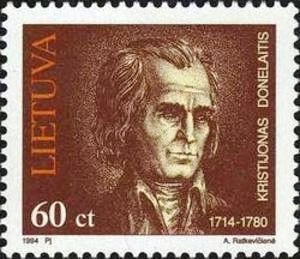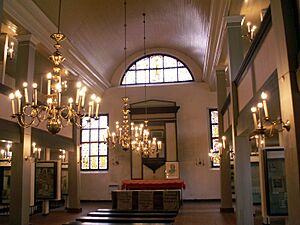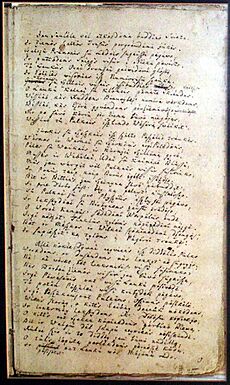Kristijonas Donelaitis facts for kids
Kristijonas Donelaitis (born January 1, 1714 – died February 18, 1780) was a famous Prussian Lithuanian poet. He was also a Lutheran pastor, which is a type of Christian minister. Donelaitis lived and worked in a region called Lithuania Minor. This area was part of the Kingdom of Prussia and had many people who spoke Lithuanian.
He is known for writing the first classic poem in the Lithuanian language. This poem is called The Seasons (in Lithuanian, Metai). It became one of the most important works in Lithuanian poetry. The poem shows the daily lives of Lithuanian farmers. It also talks about their struggles with serfdom, which was a system where farmers were tied to the land. The poem also describes the yearly cycle of life.
Contents
Who Was Kristijonas Donelaitis?
His Early Life and Education
Kristijonas Donelaitis was born in 1714 in a place called Lasdinehlen. This area was near Gumbinnen in Prussia. His parents were free farmers, meaning they owned the land they worked. His father passed away in 1720, leaving behind seven children. Kristijonas had three brothers and three sisters.
In 1731, Donelaitis started attending a special school in Königsberg. He lived in a dormitory for poor students and sometimes didn't have enough food. After finishing school, he received a scholarship in 1736. This allowed him to study at the University of Königsberg. For four years, he studied Lutheran theology. This means he learned about the Christian religion and how to be a pastor.
His studies shaped his view of the world. He learned Greek, Latin, French, and Hebrew. He also read works by famous old writers like Homer and Virgil. After university, he became a cantor in Stallupönen. A cantor helps lead church music. Later, he became the school rector there. In 1743, he passed an exam to become a pastor in Tollmingkehmen.
Life as a Pastor in Tollmingkehmen
Donelaitis lived in Tollmingkehmen from 1743 until he died in 1780. At that time, his church parish had about 30 villages and 3,000 people. About two-thirds of the people were German, and one-third were Lithuanian. In 1744, Donelaitis married Anna Regina Ohlefant. She was the widow of the school rector from Stallupönen.
He worked hard to improve his community. In 1747, he helped fix the rectory, which was the pastor's house. In 1756, he built a new brick church. During the Seven Years' War in 1757, Donelaitis and his church members hid in the Romincka Forest. They were hiding from the advancing Imperial Russian Army. When he returned, Donelaitis refused to praise the Russian Tsar. After the war, he rebuilt a school that had burned down. He also helped build a shelter for widows.
Donelaitis had many interesting hobbies. He enjoyed building thermometers and barometers. He also made musical instruments like pianos and clavichords. He passed away in Tollmingkehmen in 1780, at the age of 66.
Donelaitis's Literary Works
None of Donelaitis's writings were published while he was alive. He wrote at least three poems in German. His Lithuanian works include six fables and his most famous poem, The Seasons.
His fables are short stories with a moral, like Aesop's Fables. People believe he wrote them for his students in Stallupönen. The language in these fables is simpler than in his later works.
His main work, The Seasons, was given its title by his publisher, Ludwig Rhesa. The poem is made up of four parts, called idylls. It has almost 3,000 lines of poetry. Donelaitis worked on this poem for a long time, often changing and rewriting parts. Only two of the original parts still exist today. The other two were lost during the Napoleonic Wars. We know the full poem from a copy made by another pastor after 1794.
Between 1809 and 1818, Ludwig Rheza collected Donelaitis's works. He edited and translated them, then published them as Das jahr in vier Gesängen. This first published version was heavily edited and only contained about one-sixth of the original poem. In 1824, Rheza also published the fables. Later, more complete versions of The Seasons were published by other scholars in 1865 and 1869.
Donelaitis's Lasting Legacy
Kristijonas Donelaitis and his writings are a very important part of Lithuanian culture. His work has inspired many other artists. For example, an opera called Kristijonas was performed in 1985. It was created by Algimantas Bražinskas. In 2012, an oratorio called Seasons was performed. This musical piece was composed by Bronius Kutavičius. Donelaitis's poem continues to be celebrated and studied in Lithuania.
 | Tommie Smith |
 | Simone Manuel |
 | Shani Davis |
 | Simone Biles |
 | Alice Coachman |




